| dc.contributor.advisor | Pineda Medina, Javier Alejandro | |
| dc.contributor.author | Mena Aguilar, María Josefina | |
| dc.date.accessioned | 2022-05-11T00:28:59Z | |
| dc.date.available | 2022-05-11T00:28:59Z | |
| dc.date.created | 2019 | |
| dc.date.issued | 2022-05-10 | |
| dc.identifier.uri | http://hdl.handle.net/20.500.12404/22309 | |
| dc.description.abstract | La presente investigación analiza los factores que influyen en la transversalización
del enfoque de género en el proyecto de agricultura urbana “Alimentando Lima
Desde Adentro”, analizando el caso del Centro Demostrativo Red de Comités
Ambientales de Villa El Salvador.
A partir de encuestas con la población usuaria del proyecto, entrevistas con el
equipo ejecutor y revisión documental del proyecto, se hace un abordaje cualitativo
de la transversalización del proyecto.
Los factores que se analizan responden a las acciones que se implementan dentro
del proyecto y cómo éstas facilitan o limitan el proceso de transversalización; el
talento humano, los recursos técnicos y económicos del proyecto y cómo inciden en
la transversalización del enfoque de género. Por último, examinar la sostenibilidad
del proyecto “Alimentando Lima Desde Adentro” en la transversalización del enfoque
de género.
La agricultura urbana concibe un componente de género indispensable,
considerando que en los últimos años la participación de las mujeres en la
agricultura urbana se ha incrementado, lo que se traduce en aproximadamente el
86% del total de personas que participan de la actividad en huertos familiares,
comunitarios o institucionales (Soto, Merzthal, Ordoñez y Touzet 2008: 27).
Entre los hallazgos de esta investigación se considera que las iniciativas de
agricultura urbana deben incluir acciones genero sensitivas que respondan a las
necesidades de hombres y mujeres según sus condiciones de género, estas deben
ir más allá de la inclusión de las mujeres desde una mirada cuantificable, por el
contrario, se debe prestar especial atención en los aspectos relativos a la calidad.
Para ello, el enfoque de género debe estar presente en todas las fases del proyecto,
planteando objetivos específicos y la asignación de recursos para la
transversalización de género, lo cual garantiza acciones concretas y sostenidas,
evitando que se pierda en la totalidad del proyecto. | es_ES |
| dc.description.abstract | This research aims to deepen the factors that influence the mainstreaming of a
gender approach in the urban agriculture project “Feeding Lima From Inside” by
analyzing the case of the Demonstration Center Network of Environmental
Committees of Villa El Salvador.
Based on surveys with the user population of the project, interviews with the
executing team and documentary review of the project, a qualitative approach to the
mainstreaming of the project is made.
The factors analyzed respond to the actions implemented within the project and how
they facilitate or limit the mainstreaming process; the human talent, the technical and
economic resources of the project and how they affect the mainstreaming of a
gender approach. Lastly, examine the sustainability of the project “Feeding Lima
from Inside” in mainstreaming a gender approach.
Urban agriculture conceives an indispensable gender component, considering that in
recent years the participation of women in urban agriculture has increased, which
translates to approximately 86% of the total number of people participating in the
activity of family, community or institutional urban gardens (Soto, Merzthal, Ordoñez
and Touzet 2008: 27).
Among the findings of this research, it is considered that urban agriculture initiatives
must include gender-sensitive actions that respond to the needs of men and women
according to their gender conditions, these must go beyond the inclusion of women
from a quantifiable perspective, on the other hand, special attention must be paid to
quality aspects. For this, the gender approach must be present in all phases of the
project, setting specific objectives and allocating resources for gender
mainstreaming, which guarantees concrete and sustained actions, preventing it from
being lost throughout the project. | es_ES |
| dc.language.iso | spa | es_ES |
| dc.publisher | Pontificia Universidad Católica del Perú | es_ES |
| dc.rights | info:eu-repo/semantics/openAccess | es_ES |
| dc.rights.uri | http://creativecommons.org/licenses/by-nc-sa/2.5/pe/ | * |
| dc.subject | Género--Perú--Villa El Salvador (Lima : Distrito)--Estudio de casos | es_ES |
| dc.subject | Agricultura urbana--Perú--Villa El Salvador (Lima : Distrito)--Estudio de casos | es_ES |
| dc.subject | Proyectos sociales--Perú--Villa El Salvador (Lima : Distrito)--Estudio de casos | es_ES |
| dc.title | Factores que influyen en la transversalización del enfoque de género en el proyecto de agricultura urbana “alimentando Lima desde adentro”: análisis de caso del centro demostrativo red de comités ambientales de Villa El Salvador | es_ES |
| dc.type | info:eu-repo/semantics/masterThesis | es_ES |
| thesis.degree.name | Maestro en Gerencia Social con mención en Gerencia de Programas y Proyectos de Desarrollo | es_ES |
| thesis.degree.level | Maestría | es_ES |
| thesis.degree.grantor | Pontificia Universidad Católica del Perú. Escuela de Posgrado | es_ES |
| thesis.degree.discipline | Gerencia Social con mención en Gerencia de Programas y Proyectos de Desarrollo | es_ES |
| renati.advisor.dni | 29654086 | |
| renati.advisor.orcid | https://orcid.org/0000-0002-7060-1384 | es_ES |
| renati.author.pasaporte | 113840210 | |
| renati.discipline | 314397 | es_ES |
| renati.juror | Pineda Medina, Javier Alejandro | es_ES |
| renati.juror | Chueca Marquez, Maria Marcela | es_ES |
| renati.juror | Fort Carrillo, Maria Amelia | es_ES |
| renati.level | https://purl.org/pe-repo/renati/level#maestro | es_ES |
| renati.type | https://purl.org/pe-repo/renati/type#tesis | es_ES |
| dc.publisher.country | PE | es_ES |
| dc.subject.ocde | https://purl.org/pe-repo/ocde/ford#5.09.00 | es_ES |






